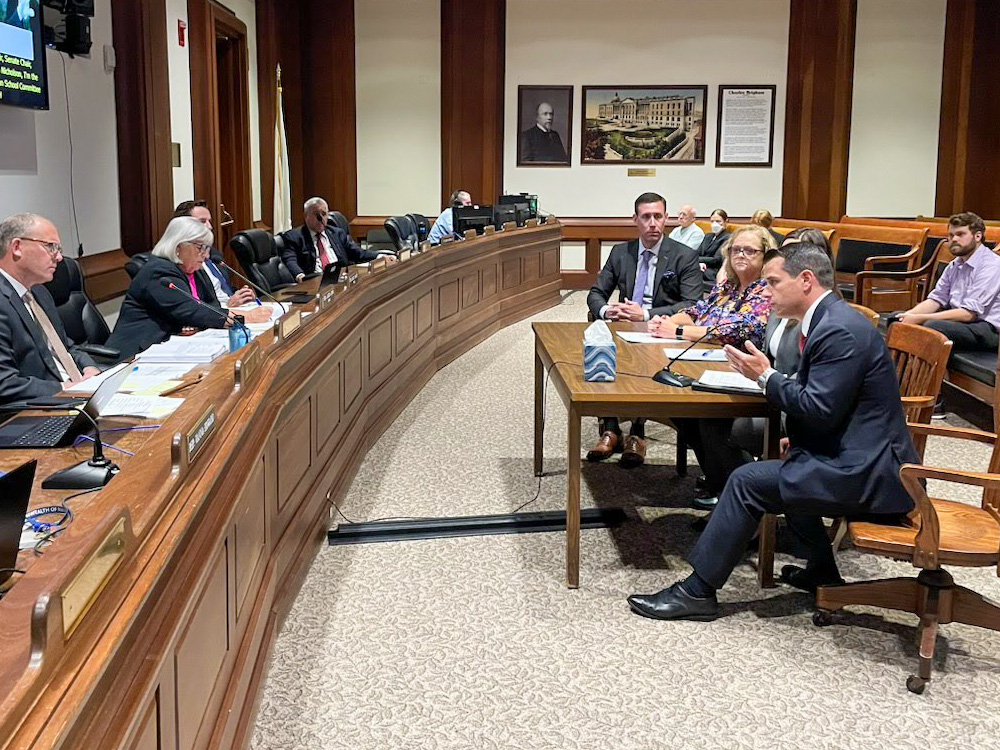BOSTON — Lynn city leaders were on Beacon Hill Monday to testify in front of the Joint Committee on Education in favor of bills calling for the modernization of school-construction funding.
Lynn Mayor Jared Nicholson, Lynn Public Schools Superintendent Evonne Alvarez, Lynn Teachers Union President Sheila O’Neil, and state Rep. Dan Cahill testified before the Joint Committee on Education at the Statehouse on Monday.
“The system that funds school buildings is broken,” Nicholson said. “However well-intentioned the designers of that system were to start, failing to take action now is defending what, in our case, has become indefensible.”
The bills, which are called Acts modernizing school construction, H.441 and S.251, are backed by Cahill, state Sen. Brendan Crighton, and state Rep. Peter Capano, and would reform the funding formula for the Massachusetts School Building Authority.
The reforms include doubling the revenue dedicated to school-construction projects, removing the cap of 80% reimbursement for MSBA-approved school-construction projects, reforming the school-construction formula to ensure low-income students have equitable access to high-quality school buildings, modernizing reimbursement rates for all school-construction projects, and adding additional reimbursement points for schools that are part of intentional school-integration plans.
Alvarez noted that these reforms would have a tremendous impact of the quality of education students receive in the schools.
“Equity is often mentioned but not taken seriously by a system that should be funding equitable access to education,” Alvarez said. “Inadequate classrooms, insufficient technology and resources, and limited accessibility for students with disabilities will impede the education experience.”
According to Alvarez, 41% of the school district’s buildings are more than a century old, while across the system, 67% of the school buildings are in need of updates.
“Those outdated infrastructures of our school buildings hinder the ability to provide a 21st-century education,” Alvarez said. “Investing in the revitalization of Lynn Public Schools’ aging buildings is an investment in the future of our community.”
O’Neil also pointed out the aging school-building system. She described the conditions of the school buildings as a dire situation that leaves students in the district at a disadvantage, especially given their large population.
“When you mix buildings in disrepair and high numbers of students in the school, the result is a crisis,” she said. “Our city cannot wait 20 years to build a new school.”
Nicholson said it is frustrating that the system is not able to accommodate the growing number of students, something he said is unfair to the parents of students in the school system.
“The spaces we have in our buildings are inadequate on many levels,” Nicholson, who served on the Lynn School Committee for three terms before his election as mayor, said. “We don’t have enough classrooms, we don’t have enough physical space for a growing student population.”
All of those testifying pointed out the need for the MSBA to change its policies, which they said leave cash-strapped gateway cities at a disadvantage.
“Their deteriorating conditions pose significant challenges to the quality of education and the safety of our students,” Alvarez said. “It really is imperative that the MSBA recognizes the urgency of the situation.”
Nicholson pointed out the hurdles the city faced in a plan to build a new Pickering Middle School due to funding concerns even after the MSBA’s reimbursement, despite the system often being cited as having substandard facilities.
“They point to our schools as examples of the worst in the state,” Nicholson said. “And yet, our project currently hangs in the balance because of the deficiencies in the school-building formula.”
At the end of his remarks, Nicholson reiterated the need for the proposed changes.
“We will not sit idly by when our students are so clearly being shortchanged,” he said.

